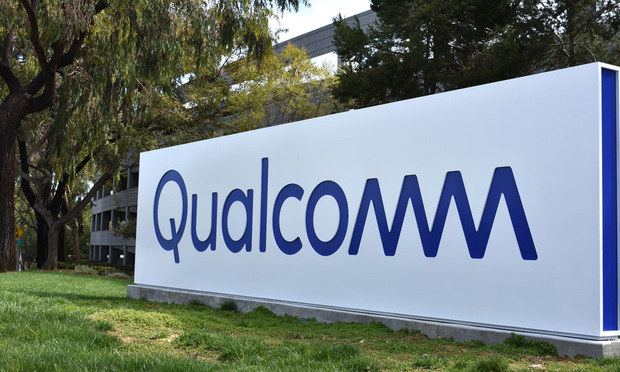Five Takeaways From Qualcomm's Move to Block Koh's Order
The San Diego chip giant says that if Judge Lucy Koh's antitrust order isn't stayed pending appeal, it will be forced into lousy licensing deals that can never be undone. But the only authority for that proposition is Qualcomm itself.
May 29, 2019 at 02:04 PM
5 minute read
The original version of this story was published on The Recorder

Qualcomm Inc. has vowed to appeal U.S. District Judge Lucy Koh's ruling last week that it unfairly used its market power over CDMA and premium 4G LTE modem chips to extract supracompetitive royalties from smartphone makers and their manufacturers.
But getting a decision from the Ninth Circuit could take years. In the meantime, Qualcomm needs to get Koh's sweeping injunction—which requires it to renegotiate all of its licenses and offer FRAND rates to chip-making competitors—put on hold.
Qualcomm asked Koh for a stay pending appeal Tuesday evening, in a motion signed by Cravath, Swaine & Moore partner Gary Bornstein. If the judge doesn't grant it, Qualcomm will undoubtedly file a similar motion with the Ninth Circuit. Here are five quick takeaways.
1. Qualcomm's best argument: Prejudicial patent chaos. If Koh's order isn't stayed, a lot of smartphone makers could demand new licenses on presumably better terms. Or worse, from Qualcomm's point of view, they could now declare themselves licensed by virtue of their phones using Qualcomm chips. “Any new agreements that Qualcomm is compelled to enter while the appeal is pending would remain effective even if Qualcomm ultimately prevails before the Ninth Circuit,” Bornstein writes. “This would not only irreparably harm Qualcomm, but also would deny Qualcomm its right to effective appellate review.”
2. But why couldn't Humpty Dumpty be put back together? Borstein warns that once it's forced to “radically restructure its business relationships,” Qualcomm “will not be able to return to its pre-injunction business in an orderly fashion. Nor will it be able to unwind licensing agreements it has renegotiated in the shadow of an Order that is later overturned.” OK, but why not? The only authority Qualcomm cites for this is a declaration from Alex Rogers, president of Qualcomm's licensing division, who says Qualcomm endured similar hardships when China's regulatory authorities issued a similar injunction, which Qualcomm later settled. But Qualcomm survived that ordeal. Plus, it's possible Qualcomm negotiated for this contingency when it struck a licensing deal with Apple last month. If they did, why not make deals with other licensees contingent on the outcome of an appeal?
3. Qualcomm's weakest argument: the one Judge Koh revealed as a “pretext.” Qualcomm continues to argue that it shouldn't have to license its standard-essential patents (SEPs) to chipmaking competitors because doing so causes “inefficiencies and difficulties “ that are “well known in the industry.” Koh pointed out that Qualcomm did once license its SEPs to competitors, and still does so in segments where it does not possess market power. She quoted multiple Qualcomm executives' explanation to the Internal Revenue Service that the reason they refuse is it's more profitable to license at the OEM level—“humongously” so, in the words of Qualcomm senior VP for licensing strategy Fabian Gonell. The “humongously” quote appears five times in Koh's opinion. She definitely isn't going to extend a stay on this ground, but Qualcomm can try its luck with the Ninth Circuit.
4. Qualcomm has plenty of other potential grounds for a stay. As Qualcomm says in the motion, Koh's decision presents many serious issues on which fair-minded jurists could disagree. The company has come up with quite a laundry list: the scope of Qualcomm's FRAND obligations, the proof required to find breach of an antitrust duty to deal, the viability of the FTC's “surcharge” theory of competitive harm, the use of Federal Circuit damages case law to gauge reasonable royalties, and the FTC's burden to prove the likely recurrence of an antitrust violation, among others. But “taken together,” Bornstein says, “these questions overwhelmingly require leaving the status quo in place while Qualcomm pursues its appeal.”
5. 5G might make or break the stay, and the appeal. Part of Koh's rationale for the injunction was that Qualcomm is poised to dominate the next generation of wireless technology. But, Bornstein notes, Koh cut off discovery before the introduction of 5G. “No record evidence demonstrates that Qualcomm currently possesses (or recently possessed) monopoly power” over the sale of 5G modem chips, “a segment that was never alleged to constitute a relevant antitrust market, let alone one in which Qualcomm possesses market power,” Bornstein writes. This argument sounds correct on the law, but it also requires some chutzpah, given that Qualcomm's primary U.S. competitor on 5G, Intel, exited the market just last month on the same day Qualcomm struck its chip supply deal with Apple.
“Put simply,” Bornstein writes, “the stakes are high, and the readily foreseeable harms to Qualcomm and the public interest are neither academic nor hypothetical.” For Koh, that might be the very reason for denying a stay pending appeal. But for the right Ninth Circuit motions panel, it might be enough to grant one.
This content has been archived. It is available through our partners, LexisNexis® and Bloomberg Law.
To view this content, please continue to their sites.
Not a Lexis Subscriber?
Subscribe Now
Not a Bloomberg Law Subscriber?
Subscribe Now
NOT FOR REPRINT
© 2025 ALM Global, LLC, All Rights Reserved. Request academic re-use from www.copyright.com. All other uses, submit a request to [email protected]. For more information visit Asset & Logo Licensing.
You Might Like
View All
Litigators of the Week: Kirkland Trio Send a $765M Message in Tech Theft Case

Litigators of the Week: How Quinn Emanuel Team Kept It Simple—And Won $1.1B Verdict for Caltech

Daily Dicta: Why the Feds Deserved to Fail in Fitbit Trade Secrets Case

Qualcomm Asks 9th Circuit to Stay Antitrust Injunction in FTC Case
Trending Stories
- 1‘Catholic Charities v. Wisconsin Labor and Industry Review Commission’: Another Consequence of 'Hobby Lobby'?
- 2With DEI Rollbacks, Employment Lawyers See Potential For Targeting Corporate Commitment to Equality
- 3In-House Legal Network The L Suite Acquires Legal E-Learning Platform Luminate+
- 4In Police Shooting Case, Kavanaugh Bleeds Blue and Jackson ‘Very Very Confused’
- 5Trump RTO Mandates Won’t Disrupt Big Law Policies—But Client Expectations Might
Who Got The Work
J. Brugh Lower of Gibbons has entered an appearance for industrial equipment supplier Devco Corporation in a pending trademark infringement lawsuit. The suit, accusing the defendant of selling knock-off Graco products, was filed Dec. 18 in New Jersey District Court by Rivkin Radler on behalf of Graco Inc. and Graco Minnesota. The case, assigned to U.S. District Judge Zahid N. Quraishi, is 3:24-cv-11294, Graco Inc. et al v. Devco Corporation.
Who Got The Work
Rebecca Maller-Stein and Kent A. Yalowitz of Arnold & Porter Kaye Scholer have entered their appearances for Hanaco Venture Capital and its executives, Lior Prosor and David Frankel, in a pending securities lawsuit. The action, filed on Dec. 24 in New York Southern District Court by Zell, Aron & Co. on behalf of Goldeneye Advisors, accuses the defendants of negligently and fraudulently managing the plaintiff's $1 million investment. The case, assigned to U.S. District Judge Vernon S. Broderick, is 1:24-cv-09918, Goldeneye Advisors, LLC v. Hanaco Venture Capital, Ltd. et al.
Who Got The Work
Attorneys from A&O Shearman has stepped in as defense counsel for Toronto-Dominion Bank and other defendants in a pending securities class action. The suit, filed Dec. 11 in New York Southern District Court by Bleichmar Fonti & Auld, accuses the defendants of concealing the bank's 'pervasive' deficiencies in regards to its compliance with the Bank Secrecy Act and the quality of its anti-money laundering controls. The case, assigned to U.S. District Judge Arun Subramanian, is 1:24-cv-09445, Gonzalez v. The Toronto-Dominion Bank et al.
Who Got The Work
Crown Castle International, a Pennsylvania company providing shared communications infrastructure, has turned to Luke D. Wolf of Gordon Rees Scully Mansukhani to fend off a pending breach-of-contract lawsuit. The court action, filed Nov. 25 in Michigan Eastern District Court by Hooper Hathaway PC on behalf of The Town Residences LLC, accuses Crown Castle of failing to transfer approximately $30,000 in utility payments from T-Mobile in breach of a roof-top lease and assignment agreement. The case, assigned to U.S. District Judge Susan K. Declercq, is 2:24-cv-13131, The Town Residences LLC v. T-Mobile US, Inc. et al.
Who Got The Work
Wilfred P. Coronato and Daniel M. Schwartz of McCarter & English have stepped in as defense counsel to Electrolux Home Products Inc. in a pending product liability lawsuit. The court action, filed Nov. 26 in New York Eastern District Court by Poulos Lopiccolo PC and Nagel Rice LLP on behalf of David Stern, alleges that the defendant's refrigerators’ drawers and shelving repeatedly break and fall apart within months after purchase. The case, assigned to U.S. District Judge Joan M. Azrack, is 2:24-cv-08204, Stern v. Electrolux Home Products, Inc.
Featured Firms
Law Offices of Gary Martin Hays & Associates, P.C.
(470) 294-1674
Law Offices of Mark E. Salomone
(857) 444-6468
Smith & Hassler
(713) 739-1250






